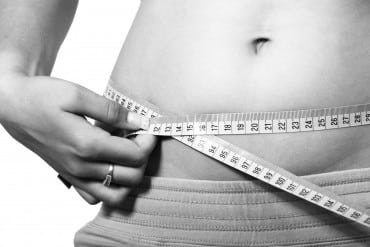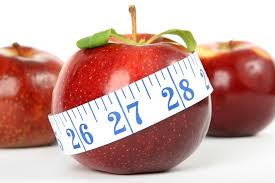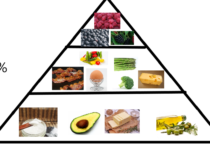Macros For Muscle Gain Female - Is There A Difference?
Nutrition has been following the trend of differentiating nutritional tips between women and men. Regarding that far more women are on a keto diet than men, while more men tend to go for low fat, there seems to be a difference.
But should women consume a different macronutrient ratio?
Or is the advice on macronutrients universal?

What Mainstream Media Suggests
Keep in mind, that mainstream media has the tendency, to depict topics from a one sided perspective. Especially with short articles or advice on instagram, it isn't possible to get a broad overview of nutrition as a topic, since it can be more complicated
There are more women following a Keto Diet than men, as there is the tendency that men should always be bulking while women should stay very slim.

But in reality the same principles apply for both men & women when it comes to lean bulking. Both genders digest and use energy & protein coming from food the same way.
But in fact there is one significant difference between men & women, which has an impact on nutrition
The Main Difference For Men & Women In Nutrition
The primary aspect that might bring some changes sin terms of nutrition and even macronutrients between men and women is quite obvioius.
Women tend to be smaller
I'm pretty sure you know that, women tend to be smaller. Since they have less weight and muscle mass, you are going to need fewer calories than most men.
Besides that the DNA is nearly exactly the same, making the nutritional needs pretty much exactly the same.
What About Macronutrients?
So since the primary difference is the caloric intake, the macronutrients are nearly the same as with men. It might be the case that women tend to have a slightly slower metabolism, although there is no scientific evidence suporting this statement.
In order to calculate your Macros, there is a relatively easy equation to follow. But before being able to use that equation you need to know two important things
Your Caloric Intake
Figuring out the right caloric intake can be more complicated than expected. Use an online calorie calculator, that integrates your level of physical activity.

Besides that it is also important to know if you want to gain muscle without gaining fat (slightly slower), or if you want to gain muscle mass as quick as possible.
In scenario 1 you should stay in a slight caloric deficit, while with scenario 2 you can be 10-30% in a caloric surplus. Please don't expect that eating a lot will make you gain muscle mass faster! In fact gaining muscle mass is primarily about the right protein intake, sleep & avoidance of overtraining!

Your Weight
Figuring out your weight is quite simple, so just step onto the scale!
The Equation:
Now that you've got all the stats, you need, it is time to put them into the following equation. You will also find an example below in case you have difficulties on calculating your macros.
Caloric Intake = Cal
Your Bodyweight = BW
Cal = (Protein x 1.5g x BW) + (Fat x 0.25 CAL) + (Carbs)
Example:
Your Weight = 65KG
Your Caloric Intake = 1800kcal
Calculating Protein:
The amount of Protein is 65kg x 1.5g = 97.5g of Protein. Which would be 97.5g x 4kcal = 390kcal of protein
Calculating Fat
The amount of fat you eat should roughly take up 25% of your caloric intake. Therefore you should eat 450kcal in fat, which would be 50g of fat. (Simply divide the 450kcal by 9)
Calculating Carbs
Since 390kcal & 450kcal are consumed by fat & protein (=840kcal) there are 1800kcal-840kcal = 960kcal remaining. By dividing 960kcal by 4 you will get 240g of carbs.
What Now?
This Equation helps you to figure out what macros are likely to work best for you. Remember that these numbers are only estimates and it might vary from person to person what works best.
If you tend to have a very slow metabolism it often works better to increase the amount of fats, while people with a fast metabolism should increase their carb intake.
The next step would be to follow the set amount of macros for 1-2 months to see how fast you get results. In case you are still unhappy you should try to play with the numbers a little.
If you feel like you've been gaining too much fat, it is likely that you have to set your caloric intake lower, while increasing the amount of fat that you eat.
On the other hand if you didn't gain any fat but also very little muscle mass you should increase your caloric intake by eating more carbs and slightly more protein (up to 2g per kg of bodyweight)
The Role Of Tracking
Knowing the macros that you should eat, doesn't really help if you do not track it. Honestly nobody is able to estimate exact enough how much protein/fat & carbs they ate this day.
If you would ask yourself how much protein you ate today you would probably not get the most accurate estimation.

This is where tracking apps come into play; my personal recommendation is to use an app called MyFitnessPal, since the free version offers more than enough features to track your calories & macros.
The app also calculates your recommended caloric intake based on your goals, activity level, weight & size which you won't even find in many online calorie calculators.
Conclusion:
Nutrition is not only about macros & calories; of course it is important to follow these two guidelines although micronutrients and especially eating foods that "hack" your metabolism matter aswell.
If that sounds exciting to you, I recommend you to take a look at my post on "how to lean bulk" which gives you more detailed information on nutrition.
Feel free to share this article with your friends & leave a comment below if you have any questions!


